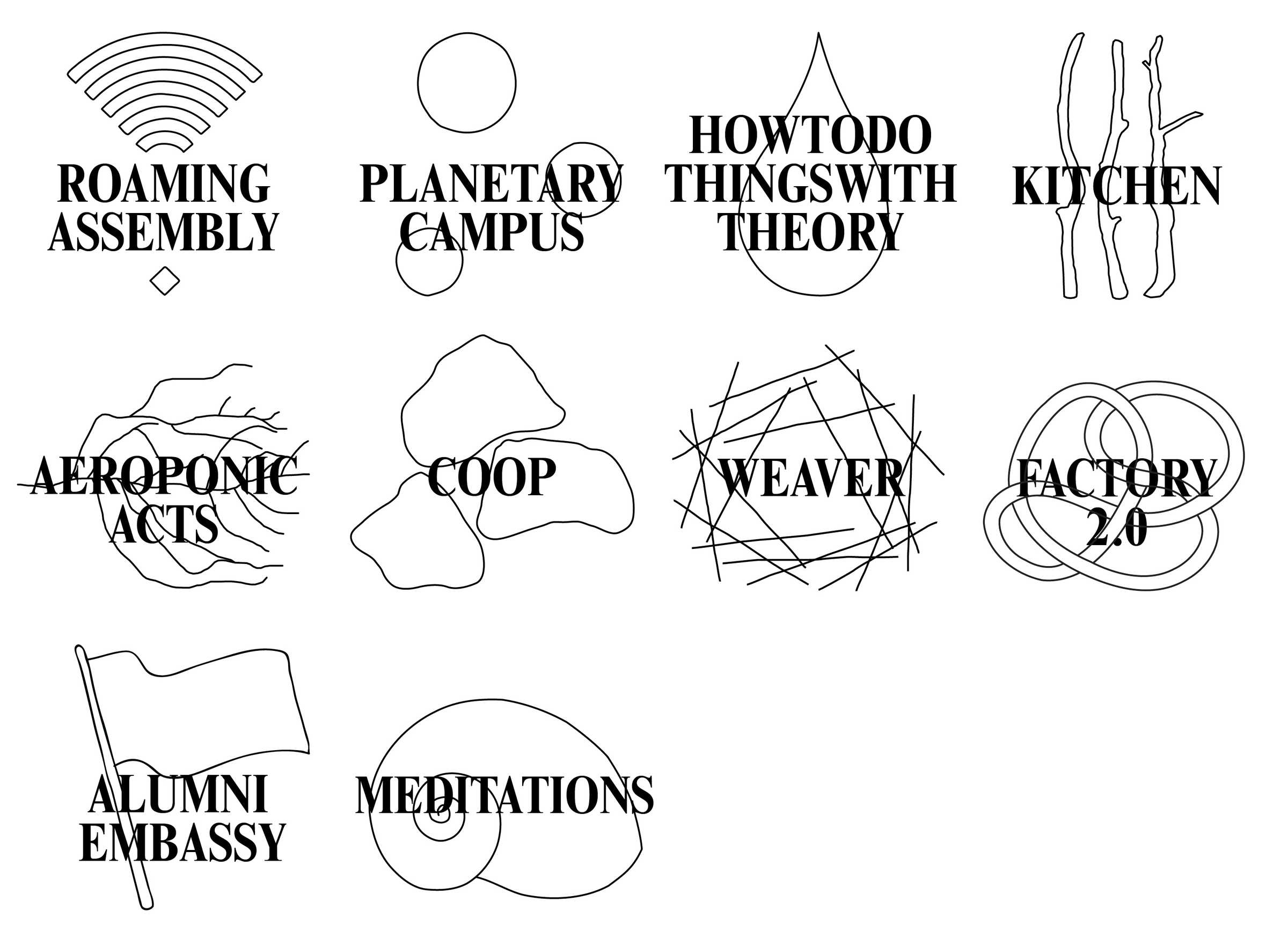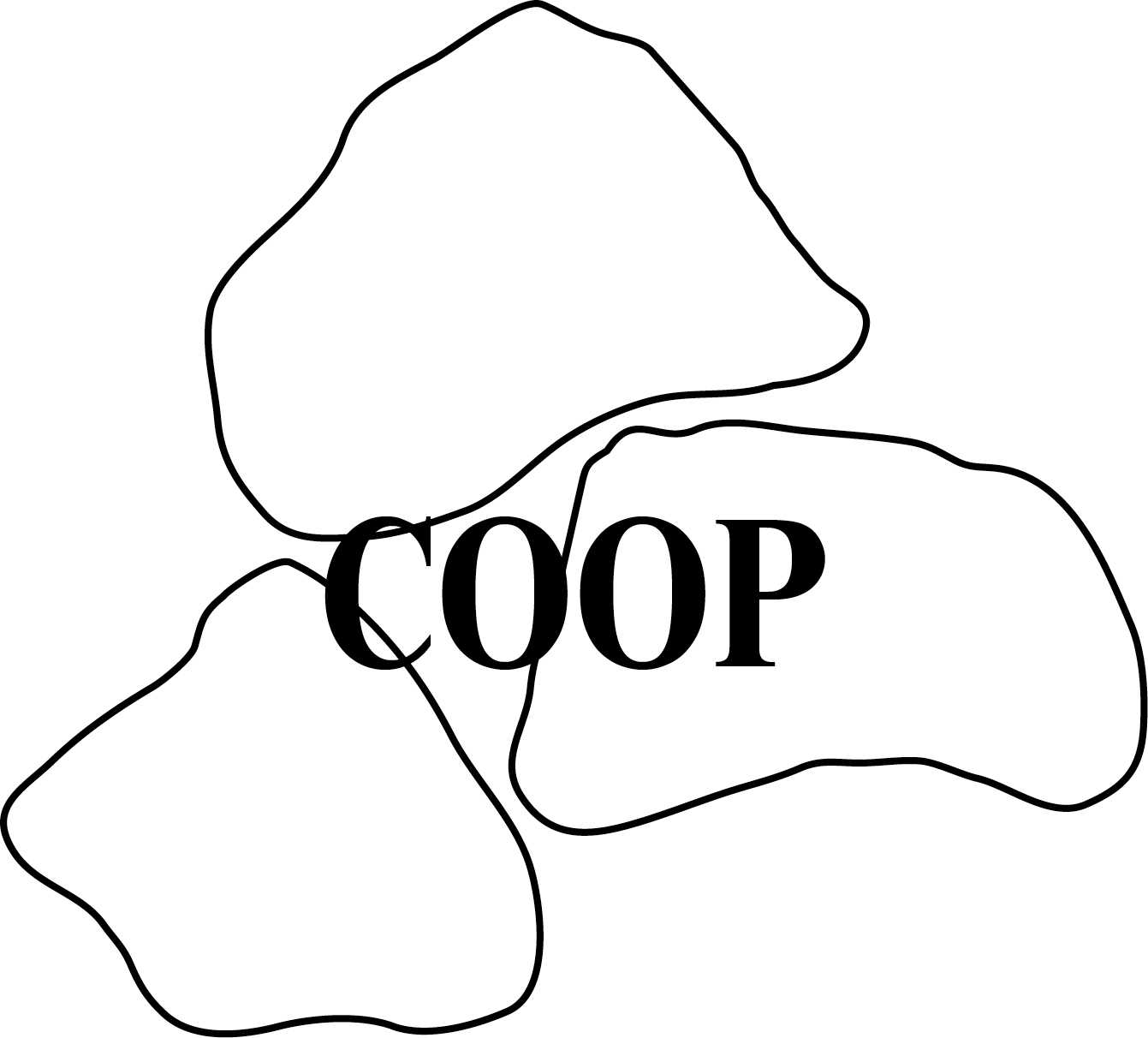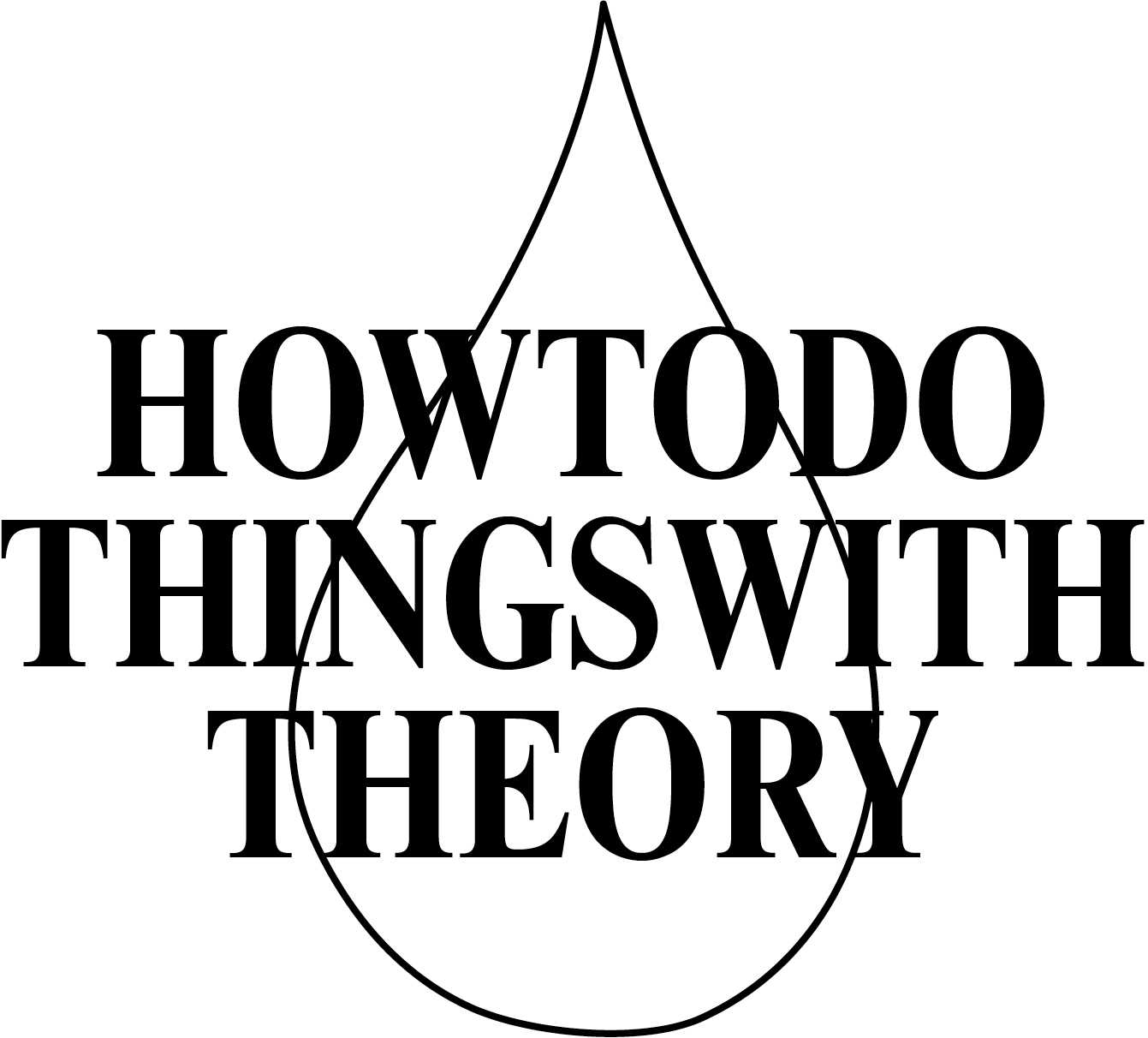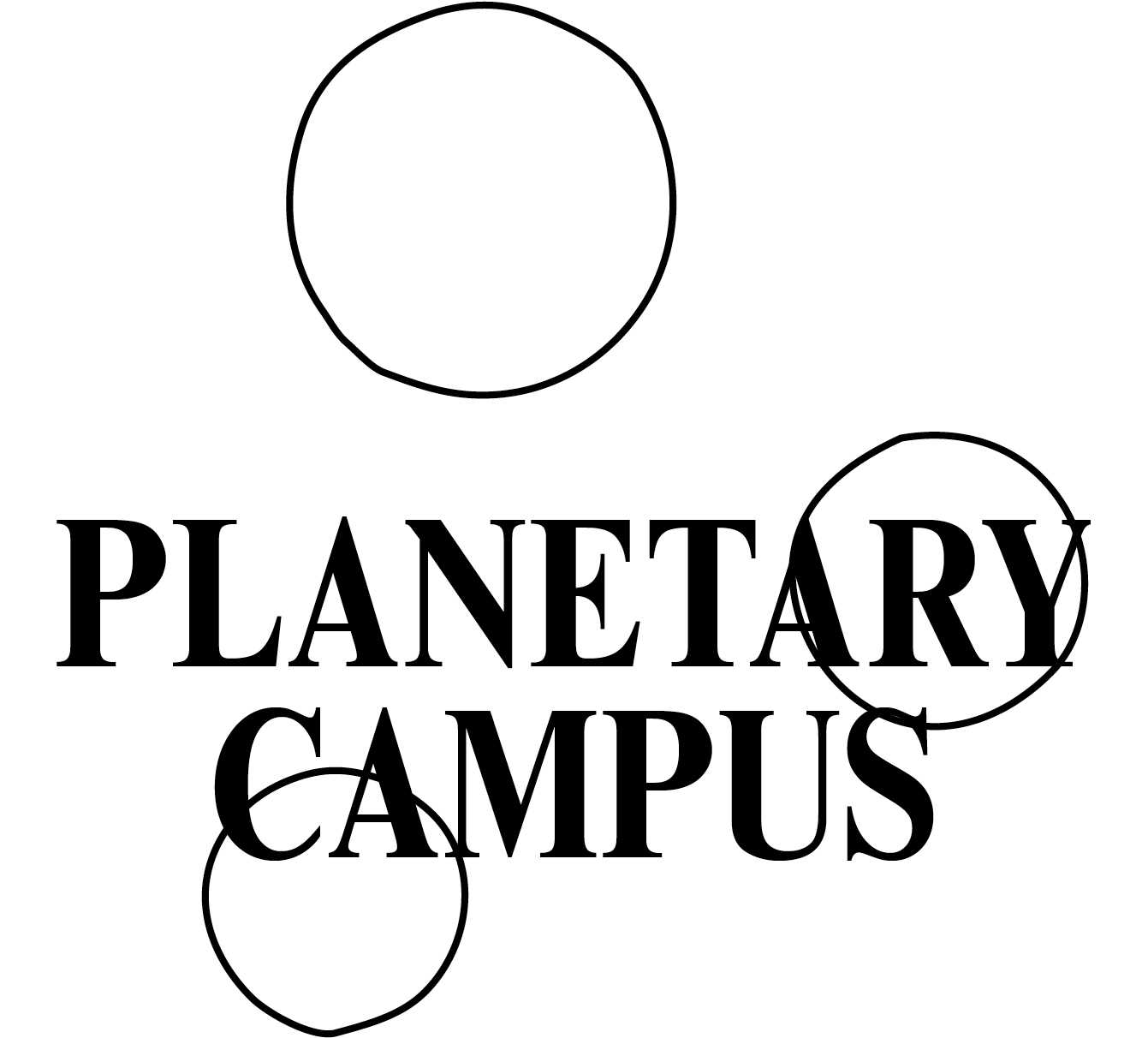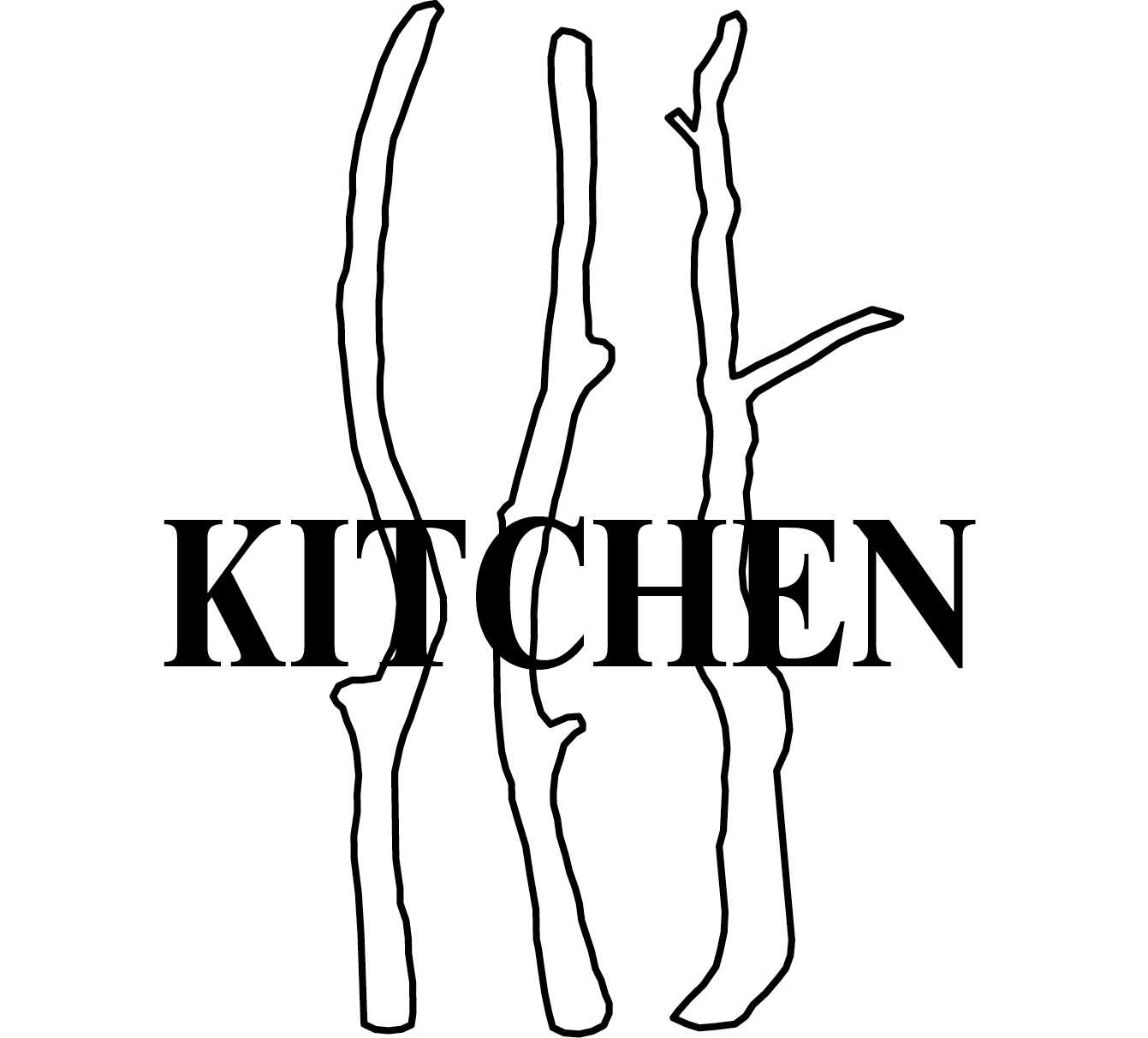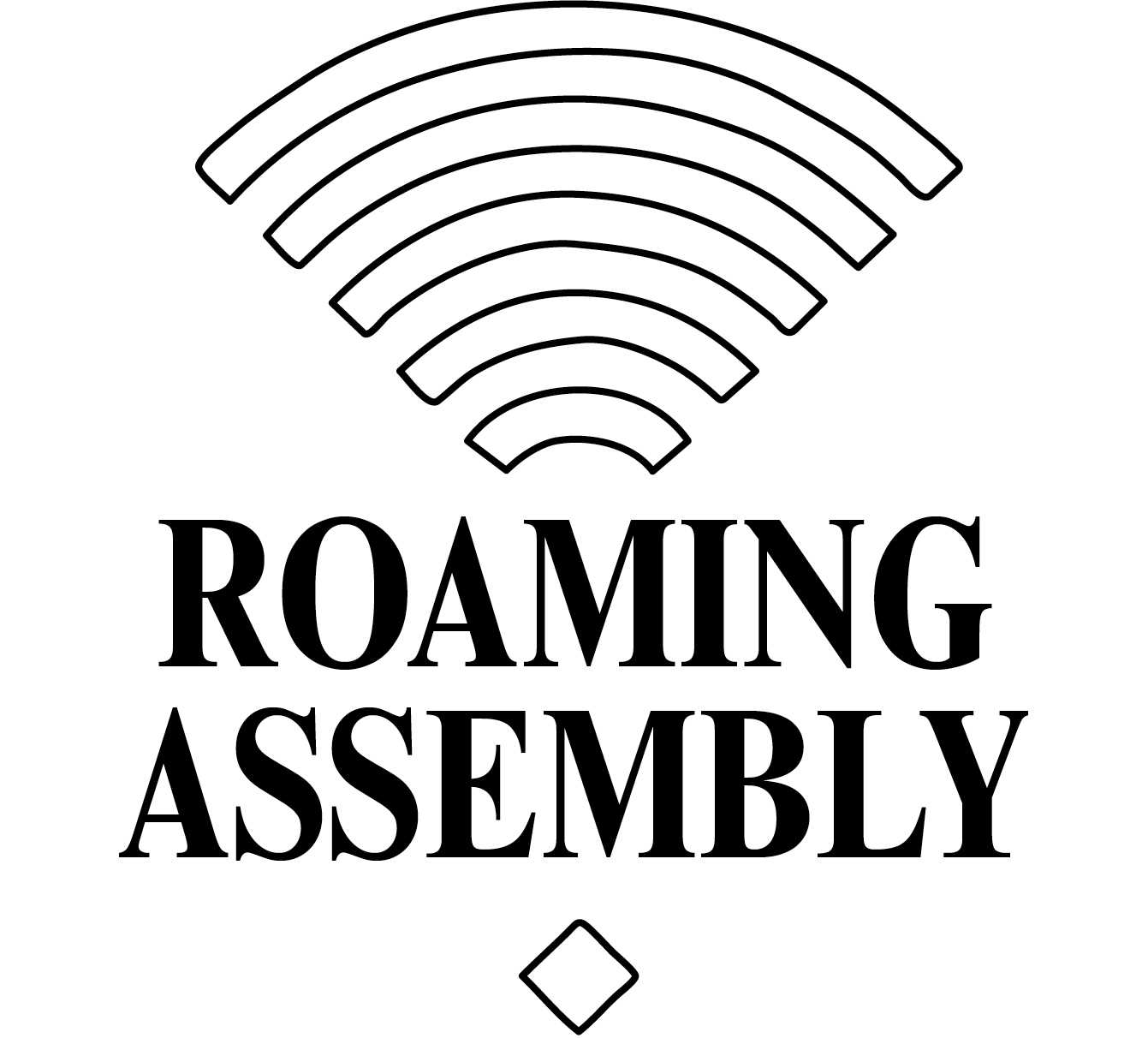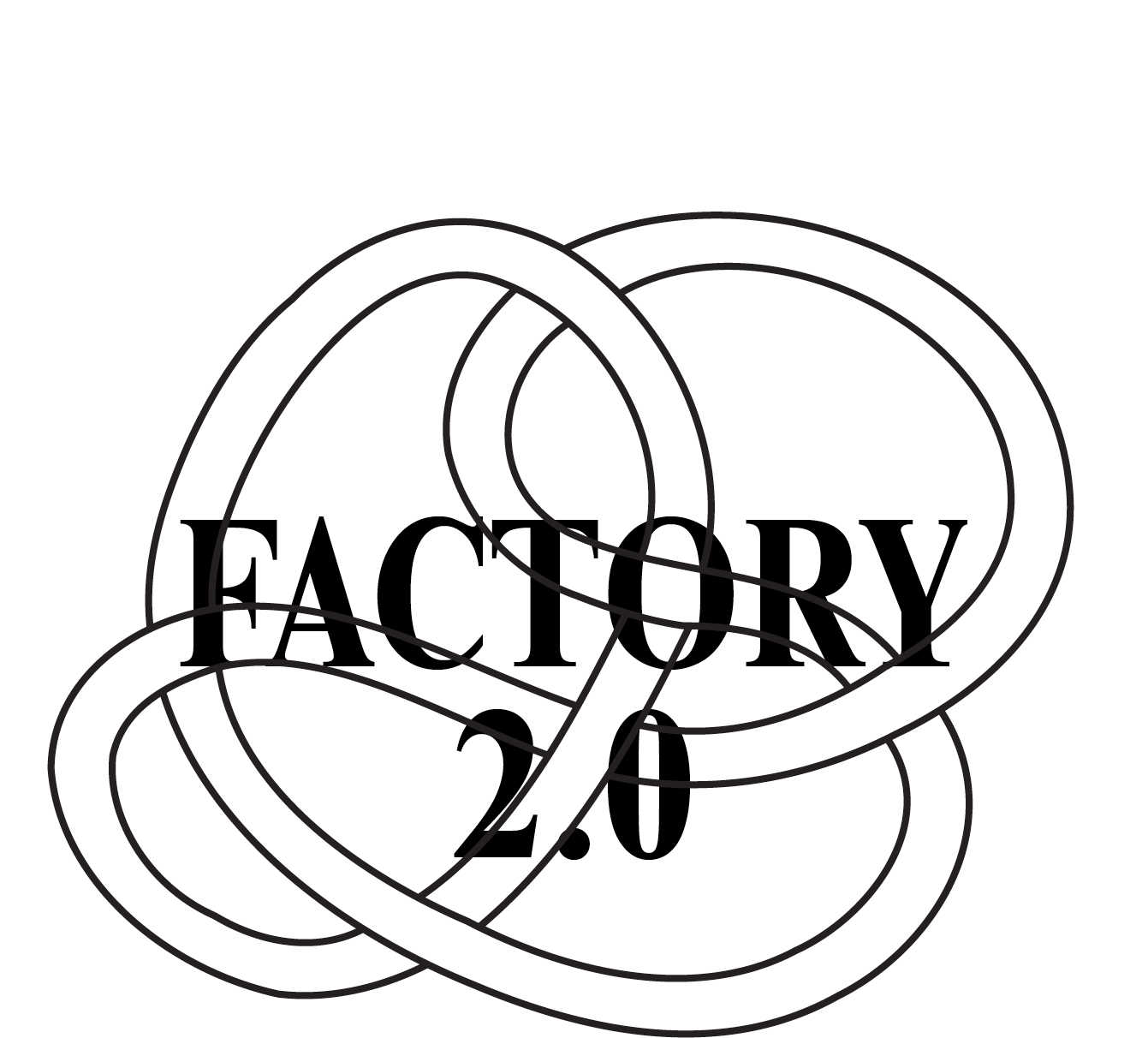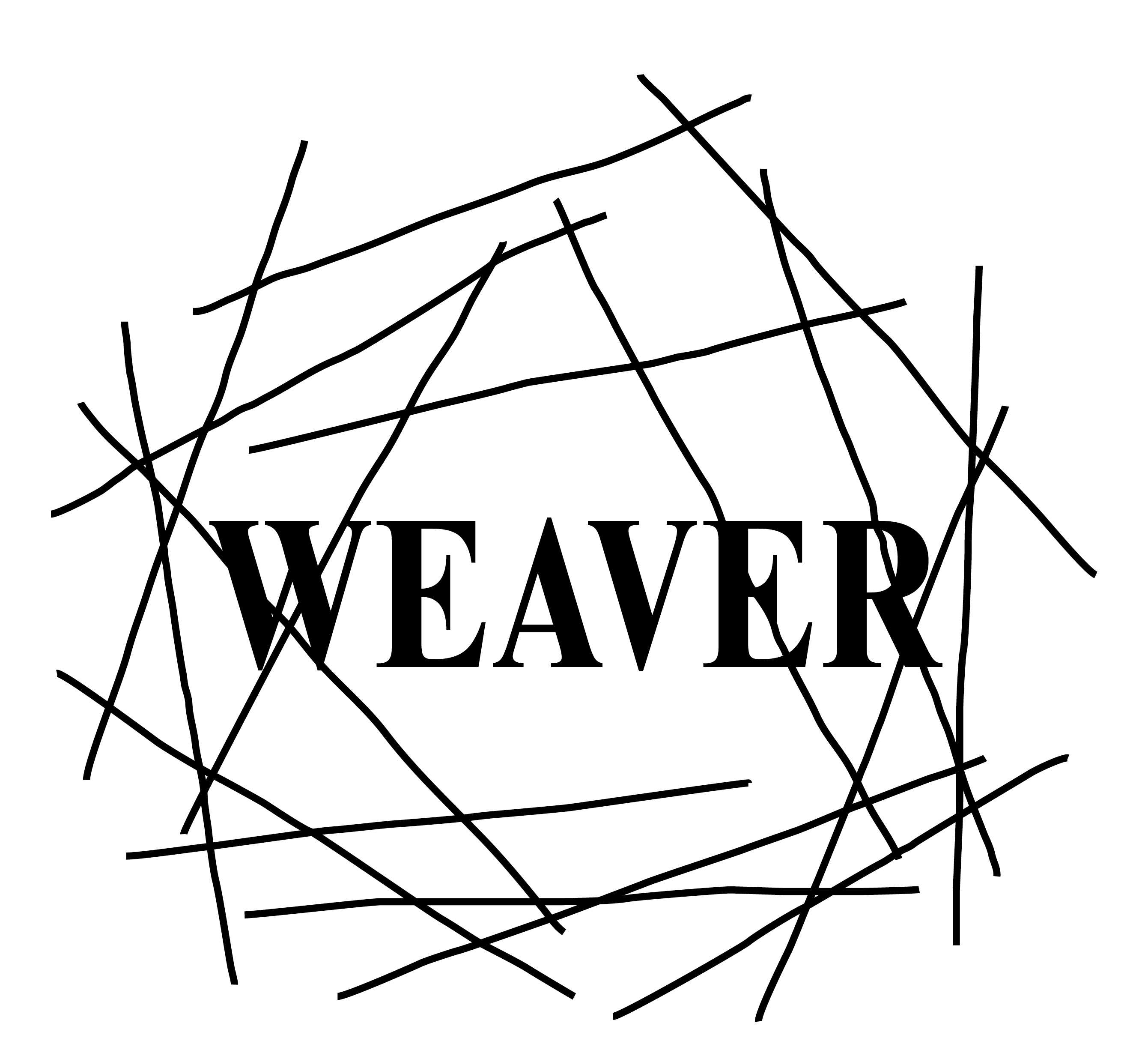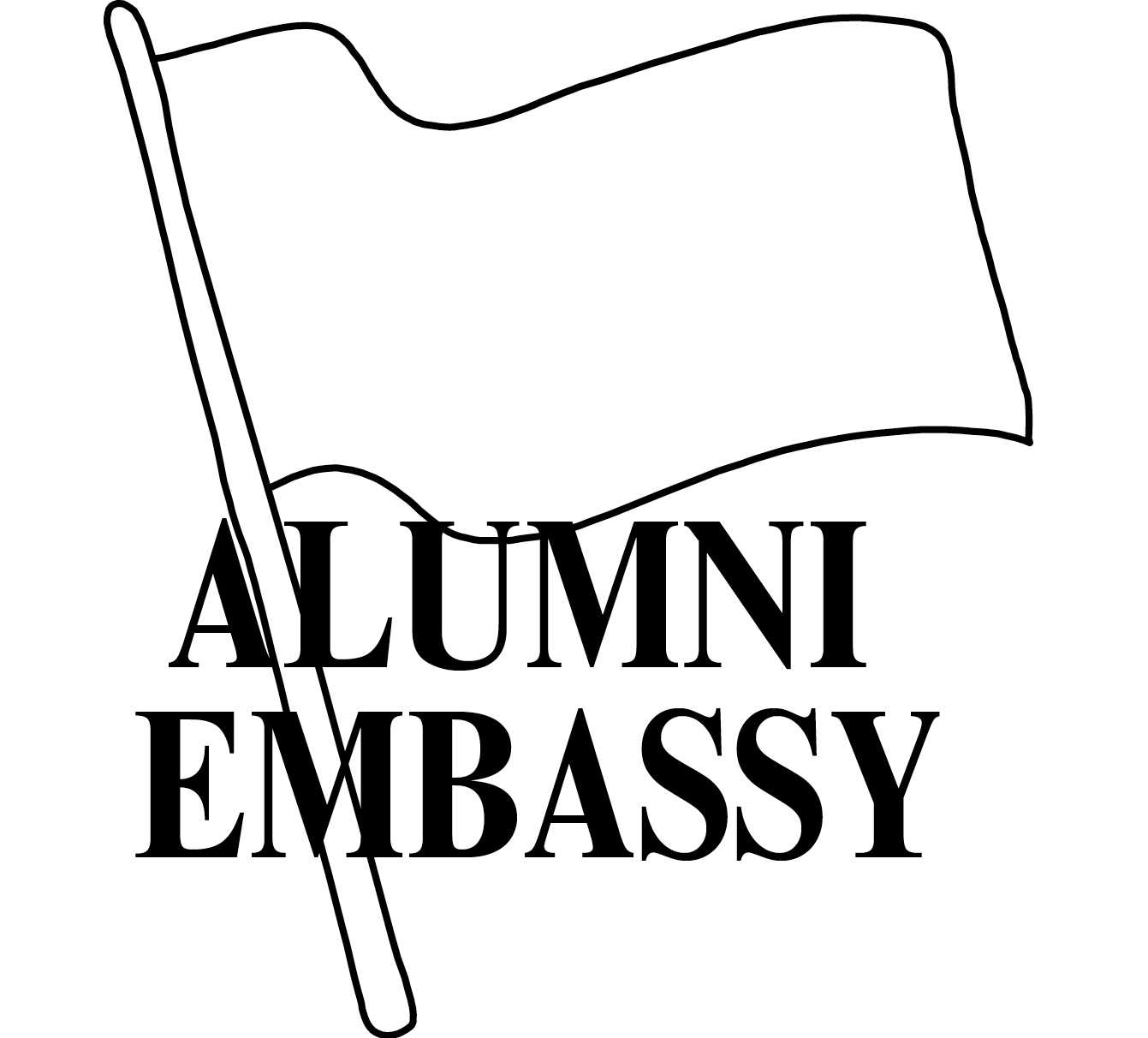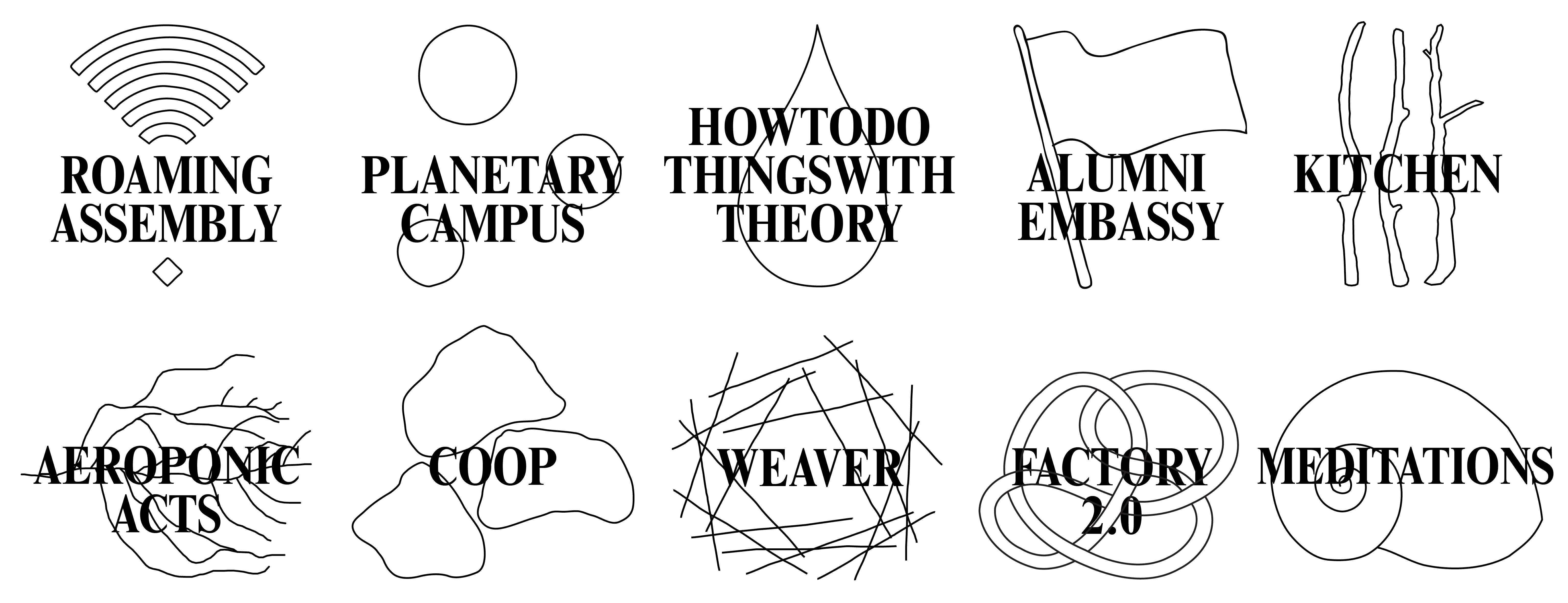Syllabus 2021 - 2022
INTRODUCTION
Dutch Art Institute a.k.a. DAI Roaming Academy stands for the entirety of our program; including its public events, archives, alumni embassy, commisioned texts and so forth. The DAI fosters "study" and "research" by means of performance, reading, writing, voicing, making, listening, curating, commoning & conviviality.
DAI Art Praxis stands for our accredited MA curriculum; in the academic year 2021-2022 described in the syllabus here at hand.
DAI Art Praxis is a permaculture, a balanced, finely tuned blend of consistency and contingency that allows for a thoughtful integration of state-of-the-art research within the required competencies and learning objectives that come with our status as a fully accredited, so called Master of Arts in Fine Art and Design under Croho registration 49114 (read more here)
DAI Art Praxis stands for a two year long study trajectory. Upon succesful conclusion a total of 120 ECTS (scroll for explanation) will be awarded, of which 60 ECTS have to obtained during the first year of study. After two years of study it is possible to allow for additional time to write the required thesis. One should however be aware that a (partial) third year also means official re-enrolment and the (partial) tuition fees that come along with that (if you are currently studying at DAI and left with questions in this regard you are welcome to contact Rik Fernhout)
Please be aware that DAI is accredited as a FULL-TIME program. For each curriculum component we mention the ECTS that are accredited to you after completion, the number of contact hours during DAI Weeks as well as the time you are requested to dedicate on each curriculum component OUTSIDE of the DAI Weeks (self-study).
THE ACADEMIC YEAR 2021-2022
During the introduction week in October 2021 DAI's artistic director and the senior program coordinators have presented the framework of seminars and study groups with their corresponding methods of 'working together', to our 2021-2022 student body.
DAI explicitly asks its tutors to work with a model based on reciprocity. The regular tutors fuel and underpin a ‘curated class’ departing from research questions and study propositions, while the students are invited to contribute to the conversation with their artistic/theoretical research. Both students as well as tutors are expected to be open to ask new questions, to gain new insights and make new propositions – tutors take on leading roles, but can occasionally delegate this duty. COOP and HTDTWT-tutors, similar to students, are invited to make use of the DAI context to further their research around things that matter to them. DAI considers this to be a crucial aspect of its mission: not "knowledge transmission", but thinking and studying together.
In addition to the collective work sessions, face to face advisory meetings geared towards tailor made support for individual students, will also be organized within the framework of our 3 modules:
First and second year students will study and work together in all 3 modules, with thesis writing as the sole exception.
CURRICULUM COMPONENTS
COOP study groups: collaborative artistic research trajectories.
*1st & 2nd year students study together
*240 contact hours during DAI Weeks
*320 hours of self-study outside of DAI Weeks
*Presence is required for 90% of the contact hours of the study module during DAI Weeks (it goes without words that 100% attendance is ideal!)
*Participation in the COOP = compulsory | 20 ECTS per year
Six COOP study groups are at the heart of the DAI's curriculum. The COOPs ask for active participation in & productive contributions to, curated, cooperative, de-disciplined, art research trajectories. A COOP study group brings tutors and students together around a well-defined and relevant question or proposition.
In the academic year 2021-2022 each DAI-student will join one out of 6 study groups. COOPs have been commissioned by the DAI: for each study group a partnering organization or institution has been invited to convene a solid, small tutorial team, whereby artistic, curatorial and theoretical knowledge, experience and intuition are carefully balanced.
The 2021-2022 study groups will gather for several days during each DAI Week to share research, to study and to develop group works. Ideally these group works come into being as truly collaborative endeavors, but they may also be the umbrella for individually produced contributions, meaningfully assembled by the study group.
Gatherings can take the form of, a seminar, presentation (group or individual), reading group, walk, site visit, boot camp, laboratory, screening, interview, exhibition, examination, ritual, meditation, party, work out, exercise or otherwise. Face to face meetings with one or more of the tutors will be organized on a regular basis, to help the individual student to establish viable connections between their individual praxis and the specific field of enquiry of the study group.
A study group's modus operandi is guided by an overarching question or proposition to which the tutors as well as the students can respond with aural, visual, tactile, performative, digital, cinematographic, choreographic, architectural, curatorial, textual, theatrical, theoretical, and practical musings and findings (along guidelines formulated by the tutorial team). Input to the gatherings will have to come from all involved. Students can be asked to prepare presentations and to lead specific sessions.
Students should invest generous time, in-and outside DAI Weeks, as well as practical skills and knowledge (building, documenting, reporting, communicating, administrating etcetera) in realizing both the Chronicles as well as the final group work (COOP Summit).
CHRONICLES are online containers, collectively curated, moulded, sculpted and choreographed by the student participants in the COOP study groups to be published on the DAI’s website. Textual, visual, and aural notes echo day to day encounters during each DAI Week gathering. Taking shape by diverse forms and styles of mediation, they exist as fragmented, artistic, and lively modes of archiving how knowledge was produced and shared; thus, building a student led mnemonic reservoir.
COOP SUMMIT: the tutorial teams will take care of guiding the group towards the public presentation of a group work during COOP SUMMIT 2022. The final group work can be an action, a book, a website, an exhibition, a film, an opera, a play, a group performance, a combination of all these or otherwise.
The six 2021-2022 COOPs are:
* A Blues For Essential Workers
* You fed me when I was hungry: Food Commons and Ecology of Belonging
* SOIL IS AN INSCRIBED BODY: on Agropoetics, Land Struggles and the Aesthetics of Sovereignty
* On Tradition - Future Ancestors 2: Rurality and Law
* Curating Positions: Nostalgia for the light*: Struggles’ Reverberations in Cinema
Assessment:
Individual midterm evaluations are student led, in conversation with the tutorial team.
Research, underpinned by strong individual efforts, will be materialized in group works: the regular chronicles and the final work to be presented during the COOP SUMMIT.
Individual input to the collective output will be assessed by the tutorial team - at the end of the year long trajectory.
COOPs are concluded successfully when the student is accredited with at least a ‘satisfactory’ by the projects tutorial team for the overall review
Evaluation: insufficient (=5), satisfactory (=6), very satisfactory (7=), good (=8), very good (=9), excellent (=10).
How To Do Things With Theory: a two year study trajectory designed to develop skills to formulate relevant questions related to theory.
1st year students:
*participation in seminars, academic writing course & thesis proposal
* 78 contact hours (including academic writing course)
* 538 hours of self-study
* The students presence is required for 90% of the study module during DAI Weeks (it goes without words that 100% attendance is ideal !)
* Compulsory Choice | 18 ECTS
2nd year students:
* participation in seminars & finalization of a written thesis (2nd year)
* 70 contact hours (including face to face meetings)
* 546 hours of self-study
* The students presence is required for 90% of the study module during DAI Weeks ( it goes without words that 100% attendance is ideal !)
* Compulsory | 22 ECTS
HTDTWT consists of a series of seminars and reading sessions guided by the tutor as well as individual tutoring. The outcome of HTDTWT is a written thesis. Supported by face-to-face meetings, the student is expected to bring forward a theoretical question arising from, and therefore closely related to their praxis. Both theoretical research as well as academic writing skills, always in some relation to their praxis, will be furthered. At the end of the first year, the student submits a written thesis proposal for the writing of the thesis in the second year. The thesis must be supported by a concentrated reading of at least six titles and should have a length of between 10.000 to 15.000 words (including footnotes and bibliography). Theses with the absolute minimum of 8.000 or the absolute maximum of 17.000 words will only be accepted after agreement of the involved theory tutor.
The thesis must be presented in English and will be evaluated by the student's HTDTWT tutor and the HTDTWT coordinator. Exceptionally the given format of the thesis can be adapted to specific needs or abilities, always only after written permission from the mentoring tutor and the head of program. It is not allowed to hand in an older thesis, a text written in a different (educational) context, nor is it allowed to re-use texts produced in the context of another DAI Art Praxis component.
During the first year all students take part in academic writing course, which will look at: formulating arguments and presenting data, organisation and coherence throughout a text, writing clear and concise paragraphs, structure and discourse as well as the use of sources (summarizing, paraphrasing, quoting, and referencing).
The six HTDTWT Seminars 2021-2022 are:
* Love is the answer! What is the question?
* (non)Performance & (non)Performativity: Archives, Experiments, Stakes
* Decolonising Attention: Perception, Movement, Technics Within and Against the Postcolony
In addition, second year students this year are invited /encouraged to attend the non-compulsory Supervalent/Lateral Writing Workshop
Assessment:
At the conclusion of the first year, each student will be assessed by the HTDTWT tutor and the HTDTWT coordinator on "research & participation” in the seminars (including the academic writing course), and “research & writing" for the thesis proposal. Both assessments are brought together in an overall assessment.
At the conclusion of the second year, each student will be assessed by the HDTWT tutor(s) and the HTDTWT coordinator on “participation and research” in the seminars, and on “research and writing” for the thesis. Both assessments are brought together in an overall assessment.
How To Do things with Theory is concluded successfully when the student is credited with at least a ‘satisfactory’ by the tutor(s) in the overall assessment.
The Planetary Campus is an innovative conceptual space where the MA curriculum "DAI Art Praxis" opens to a wide variety of productive encounters with external and internal positions and interests.
The Planetary Campus aggregates interfaces between academic and artistic researchers, between the academy and the world, between DAI-students and DAI-alumni as well as between DAI-students and the DAI as institutional framework. Here, perspectives on co-production and co-creation, on orality and performance, research, and publicness, and on the politics and the poetics, the ethics, and the aesthetics at, and of the DAI (and beyond) can be explored through a variety of formats.
211 contact hours / 293 hours of self-study
This curriculum component consists of five different modules:
Planetary Campus ~ The Kitchen:
Each DAI Week, one day is dedicated to acts, lectures or lecture-performances (recognized here as a longstanding unique discipline, a hybrid of research, lecture, visual art and performative narrative techniques) performances, screenings or presentations, directed and steered by 11 to 12 individual students (each month a different constellation of names). Each Kitchen Act of 20 minutes is authored by one student but may involve invited "others" as collaborators, assistants, or audience-participants.
The Kitchen-format offers students the possibility to present/activate their work and research updates, proposals, experiments and other relevant or urgent musings, in a context that is independent from the other constituents of the curriculum. For DAI, as a roaming academy without studio spaces, this is the platform where "praxis" in its broadest sense can be shared among the entire student body as well as with ‘outside’. Embedded in a rigorous curriculum consisting of curated, collective study groups and seminars, the Kitchen offers each student a sheltered ‘free space’: for the duration of twenty uninterrupted minutes where they are invited to ‘speak’ to an audience consisting of all their fellow students, DAI’s director and one or more, monthly changing guest respondents (invited makers and thinkers).
To guarantee that each student can have the full 20 minutes for their act + 20 minutes for the responses to their act, the Kitchen comes with a quite strict protocol. Beginning their presentation with a carefully crafted key question, each student presents work/research by means of performance, talk, performance- lecture, screening, reading, recital, choreography, play, concert, demonstration, action, presentation of relevant aspects of praxis or work in progress or process, reference sets or, a combination of (some of) these formats. Other than the limits of the given time and space frame and some basic curatorial rules there are actually no restrictions to the content and the format of the presentation.
Following each presentation, in a conversational mode, the invited respondent(s) will try to engage with the presentation by means of an improvised, non-judgmental, raw, sketchy, tentative, spoken reflection, (roughly) guided by ‘the question’ as well as by the respondents' own concerns, interests and knowledges.
Apart from the, on the spot, improvised responses to The Kitchen presentations & The Question by the invited, monthly changing guests, each student is furthermore offered one intensive and entirely personal advisory session (face to face) with a specially assigned Kitchen Coach, whose advises will be projected towards the final presentations. For second year students this concerns their so-called AEROPONIC Acts. First year students will be working towards their end of year Kitchen presentations.
Each DAI-week, during the days after their Kitchen presentation, each of the students who have been performing/presenting in that week will have an individual feedback session of an hour with DAI’s director. For the fourth and final presentation of the two-year trajectory, the so-called AEROPONIC ACTS, a public presentation space will be made available, and the filmed documentation of the presentation/ performance will be published on the DAI’s website.
The two-year learning curve, including the AEROPONIC ACTS, will be assessed by the Head of Program, carefully weighing the relevance, care, resourcefulness, creativity and acumen with which a student has managed to make use of this two-year trajectory, with the generous comments of the guest respondents over time, as an informative back drop.
The Kitchen is concluded successfully when the student is accredited with at least a ‘satisfactory’.
Planetary Campus ~ ROAMING ASSEMBLY
The Roaming Assembly is a recurring public symposium convened by guest curators and scheduled to take place several times per year at a variety of locations. It functions as it were as the DAI-week's 'centerfold' event: a state-of- the-art speculative and hybrid program exploring specific themes and topics of contemporary relevance to the thinking of art in the world today, a welcoming hub where art, research and production work are generously shared between, presenters and the public, where complexity can be embraced, and intellectual intra-actions are fostered. Although closely interlinked with the core issues addressed by the DAI's academic program, Roaming Assembly editions are not conceived as plain extensions of the regular DAI classes and seminars, but rather envisioned as sovereign happenings, designed to “mobilize our bodies, our intelligences” and to connect DAI to wider discourses.
Assesment Roaming Assembly: the student must hand in a written reflection on the Roaming Assembly of MIN 300 - MAX 2000 words. A deadline will be communicated. Assessed by the Planetary Campus Team / Evaluation: pass or fail
Planetary Campus ~ Factory 2.0
Factory 2.0 offers the students time and space to engage with a variety of activities, self-organised among students with the support of the Planetary Campus Team, both on a structural base as well ad hoc. Factory 2.0 aims to offer students agency and responsibility in relation to DAI’s modus operandi at large: as co-creator, communicator, co-producer, learner, listener, organiser, participant, performer, presenter, reporter, researcher and respondent.
Embedded in the time frame of Factory 2.0, student led activities encompass all group initiatives and undertakings organized by the student body.
Assesment Factory 2.0: half-way July 2022 the student must hands in a brief self-evaluation of 200 - 500 MAX words / sign off by the Planetary Campus team / Pass or fail
Planetary Campus ~ Weaver
Weaver offer students to engage on weaving the relational space among the curators and guests of upcoming Roaming Assemblies and the DAI community at large.
Weaver takes as a (given) starting point the conceptual and contextual parameters or each Roaming Assembly edition and knits the roof under which each symposium’s organizational components and its participatory/co-creative protentional are projected, propositioned, and actualized. To that extend Weaver is envisioned as a small unit (with the possibility of temporal expansions/recruits) implementing a range of skill sets and assuming a variety of positions: learner, participant, recruiter, reporter, co-producer, co- organizer and host.
Planetary Campus ~ Presence at the Alumni Embassy (2nd year only)
DAI’s Planetary Campus extends far beyond the moment of graduation: DAI is committed to keep the conversation going. The Alumni Embassy, accommodated by the DAI website provides a curated platform from where former students can keep the DAI community, as well as DAI’s wider network updated on their activities. All graduates collaborate with the DAI Archive + Communication teams on the creation of a representative, relevant individual page, hosted and maintained by DAI at the Alumni Embassy, containing a commissioned portrait, keywords, a brief bio, links to social media (if professionally relevant) and eventual websites. Evaluation: Pass or Fail
ECTS credits
A student's workload is measured in ECTS credits. ECTS stands for European Credit Transfer and Accumulation System and is a standard across the European Union. One credit represents 28 hours of work and 60 credits represent one year of full-time study. DAI students must 'earn' 120 EC credits before obtaining their MA certificate. ECTS credits are not related to a content driven quality assesment.
http://ec.europa.eu/education/ects/users-guide/glossary_en.htm#learning-outcome
EER: the official Exam Regulations controlled by ArtEZ University
The official Exam Regulations 2021-2022 (a slightly extended and more technical version of this Syllabus) have been provided to individual students. They are also available to students at the log-in section of the ArtEZ website. Please contact Rik Fernhout if you need help tracing them.

